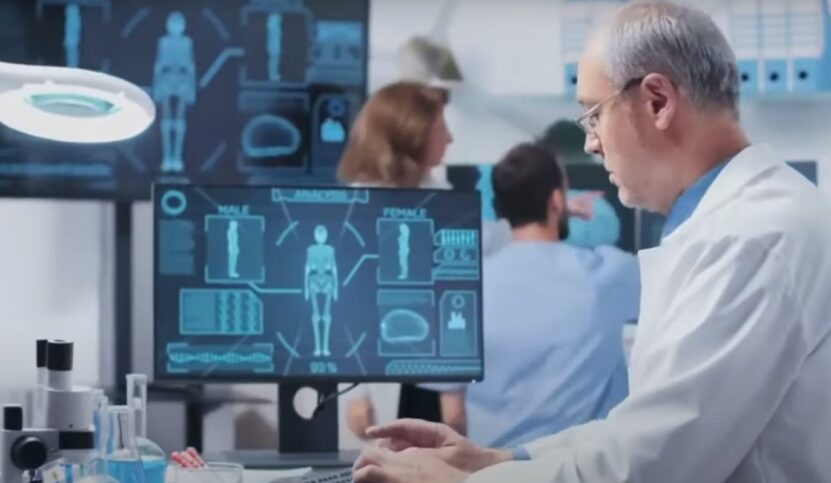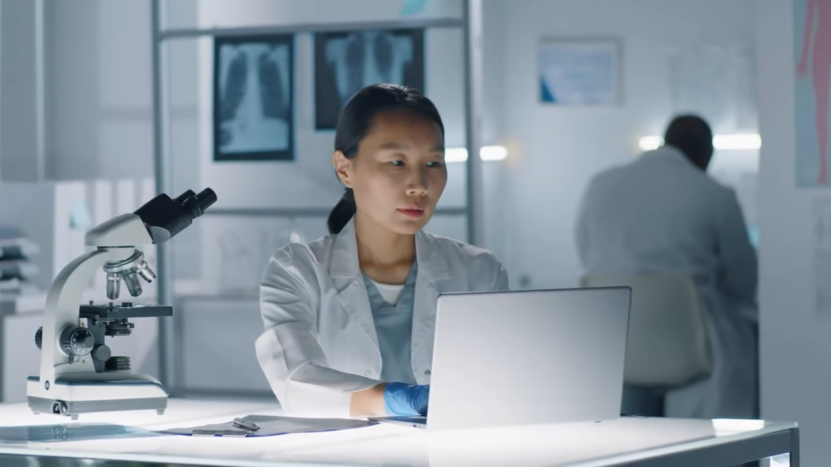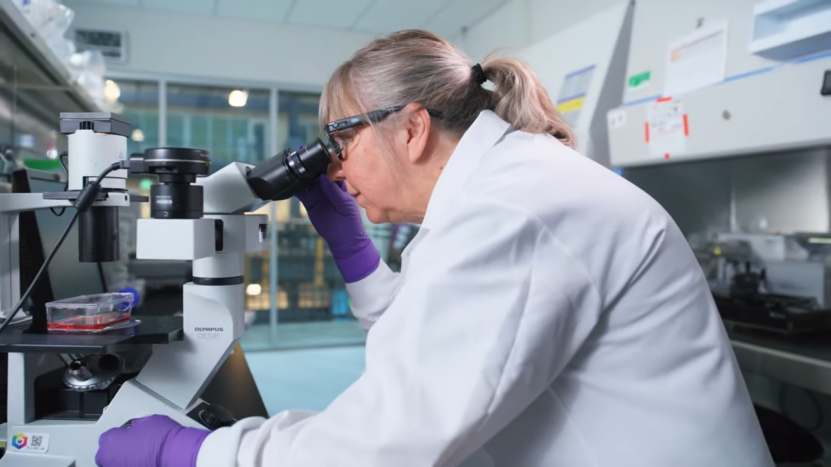If you are interested in the intersection of technology and medicine, you might have heard of two fields that sound similar: bioinformatics and health informatics. But what are they exactly, and how do they differ from each other?
In this blog post, we will explore the definitions, applications, and career paths of these two disciplines, and highlight some of the key differences between them.
How do They Differ?

Bioinformatics and health informatics are both fields that use technology and data to advance biology and medicine. However, they differ in several aspects, such as:
- The nature and origins of their data. Bioinformatics primarily handles molecular and genomic data, originating from lab experiments and sequencing technologies. In contrast, health informatics is concerned with clinical and administrative data, produced by healthcare systems and processes.
- The scale and breadth of their analysis. Bioinformatics focuses on the intricate molecular and cellular aspects of life and disease at a microscopic level. Health informatics, on the other hand, takes a broader approach, concentrating on health outcomes and determinants at an individual and population level.
-
The table below summarizes some of the key differences between bioinformatics and health informatics.
| Aspect | Bioinformatics | Health Informatics |
| Focus | Biological data analysis | Healthcare information management |
| Key Activities | Sequence analysis, gene finding, drug design | Managing patient data, analyzing health records |
| Data Concerned | Molecular biology data (DNA/RNA, proteins) | Patient, clinical, and public health data |
| Goal | Solve biological problems using computation | Improve healthcare outcomes through data management |
| Techniques Used | Algorithms, computational/statistical techniques | Technology for data organization and analysis |
Bioinformatics Career Paths

Bioinformatics professionals typically have a strong background in computer science, mathematics, statistics, and biology. They can work in various settings, such as academic institutions, research laboratories, biotechnology and pharmaceutical companies, and government agencies.
Some of the common job titles for bioinformatics professionals include.
Analyst
This role involves processing, analyzing, and interpreting biological data using various software and algorithms. Responsibilities include developing and maintaining databases and web portals for data storage and sharing.
Educational requirements often include a bachelor’s or master’s degree in bioinformatics, computer science, biology, or similar fields, coupled with experience in data analysis and programming.
Engineer
This position focuses on creating, testing, and implementing software tools and applications for managing and visualizing biological data. Tasks may also involve designing and enhancing the infrastructure and efficiency of bioinformatics systems and platforms.
Typically, a bioinformatics engineer holds a bachelor’s or master’s degree in bioinformatics, computer science, engineering, or related areas, with experience in software development and engineering.
Scientist
The primary responsibility here is to lead and conduct bioinformatics research projects, aiming to solve biological problems and questions. This role also encompasses publishing and presenting research findings, as well as collaborating with other scientists and relevant parties.
A doctoral degree in bioinformatics, computer science, biology, or related fields is usually required, along with experience in bioinformatics research and methodologies.
Health Informatics Career Paths

Professionals in health informatics often come from backgrounds in healthcare, information technology, or a combination of both. They find employment in diverse settings like hospitals, clinics, healthcare organizations, public health agencies, and consulting firms.
Common roles in this field include:
Specialist
This role involves the implementation and management of health information systems and technologies within healthcare environments. Responsibilities also include training and supporting healthcare staff in the utilization and advantages of these systems.
Typically, a health informatics specialist holds a bachelor’s or master’s degree in health informatics, information technology, healthcare administration, or similar fields, along with experience in health information systems.
Analyst
This position is focused on gathering, analyzing, and reporting health-related data using various analytics tools and methodologies. Additional duties may include developing and applying clinical guidelines to aid evidence-based practices and decision-making.
Educational requirements often include a bachelor’s or master’s degree in health informatics, information technology, statistics, or related areas, coupled with experience in data analysis within the healthcare sector.
Manager
This role entails the oversight and coordination of health informatics activities and projects within a healthcare organization or department. Key responsibilities include evaluating and enhancing the performance and quality of health information systems and ensuring adherence to standards and regulations.
A health informatics manager usually possesses a master’s or doctoral degree in health informatics, information technology, healthcare administration, or related fields, and has experience in health informatics management and leadership.
The Vital Role of Bioinformatics

In the ever-evolving landscape of medical science and technology, bioinformatics stands out as two fields making significant strides.
Drug Discovery and Development
At the heart of bioinformatics is its application in drug discovery and development. Scientists use bioinformatics tools to sift through vast amounts of biological data.
This process aids in identifying potential drug targets – molecules within the body that can be influenced by drugs. Once these targets are identified, bioinformatics is again called upon to assist in the design and testing of new drugs.
It also plays a crucial role in predicting the efficacy and safety of these drugs, ensuring that they perform their intended function without causing adverse effects.
Genomics Research
Another crucial application of bioinformatics lies in genomics research. With the advent of large-scale genome sequencing, researchers are faced with the challenge of making sense of immense datasets.
Bioinformatics provides the computational power needed to analyze these datasets, enabling scientists to identify genes and mutations linked to various diseases. It’s not just about identifying these genetic elements, but also understanding how they interact with each other and tracing the evolutionary journey of different species.
Personalized Medicine
Perhaps one of the most exciting applications of bioinformatics is in the realm of personalized medicine. By analyzing a patient’s genetic and molecular profile, bioinformatics helps in developing personalized treatment plans.
This approach ensures that treatments are tailored to the individual’s unique biological makeup, potentially increasing the effectiveness of the treatment while minimizing side effects.
Transforming Healthcare Through Health Informatics

Health informatics revolutionizes healthcare through electronic health records, clinical decision support systems, and public health surveillance.
Electronic Health Records (EHRs)
In health informatics, one of the fundamental applications is the development and maintenance of Electronic Health Records. EHRs are digital versions of patients’ medical histories and are crucial in modern healthcare for storing, retrieving, and updating patient information.
The implementation of EHRs has revolutionized how patient data is managed, making it more accessible and secure.
Clinical Decision Support Systems (CDSS)
Health informatics also plays a pivotal role in developing Clinical Decision Support Systems. These systems are designed to provide healthcare professionals with real-time information and recommendations.
By analyzing patient data and medical knowledge, CDSS can offer insights that assist clinicians in making more informed decisions, ultimately enhancing patient care.
Public Health Surveillance
Another significant application of health informatics is in public health surveillance. This involves the monitoring and analysis of public health data to identify trends, outbreaks, and risk factors for diseases.
Health informatics tools are used to collect, analyze, and interpret data from various sources, enabling public health officials to make informed decisions about how to best protect the population.
Frequently Asked Questions
Can bioinformatics be applied in non-medical fields?
Yes, bioinformatics has applications beyond medicine. It’s used in agriculture to improve crop yields and resistance, in environmental science for biodiversity conservation, and even in forensic science for DNA analysis.
What are some emerging technologies in health informatics?
Emerging technologies in health informatics include artificial intelligence for predictive analytics, blockchain for secure data sharing, and Internet of Medical Things (IoMT) for enhanced patient monitoring.
How does bioinformatics contribute to vaccine development?
+
In vaccine development, bioinformatics is pivotal for identifying viral genome sequences and predicting antigenic components. This facilitates the design of effective vaccines targeting specific pathogens.
Are there ethical concerns unique to health informatics?
Yes, health informatics raises ethical concerns, particularly regarding patient data privacy, security of health records, and equitable access to digital health resources.
Can someone with a healthcare background shift to bioinformatics?
Yes, individuals with a healthcare background can transition to bioinformatics. It often requires additional training in data analysis, computational biology, and programming.
How significant is programming knowledge in bioinformatics?
Programming knowledge is quite crucial in bioinformatics. Skills in languages like Python, R, or Java are often necessary for data analysis, algorithm development, and bioinformatics software tool creation.
Final Words
Bioinformatics and health informatics are two distinct fields that use technology and data to advance biology and medicine. It deals with molecular and genomic data and aims to discover new biological knowledge and applications.
Health informatics deals with clinical and administrative data and aims to improve health care and public health. Both fields offer different career paths for professionals who are interested in technology and medicine.
If you are considering pursuing a degree or a career in either field, you should carefully weigh the pros and cons of each option, and choose the one that matches your goals and interests.
